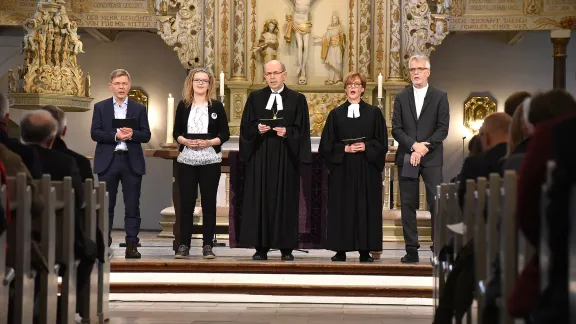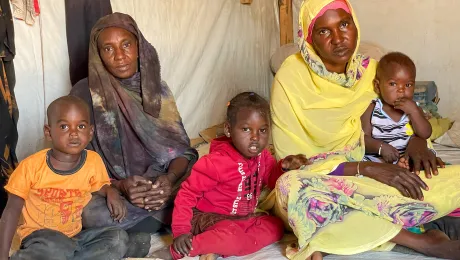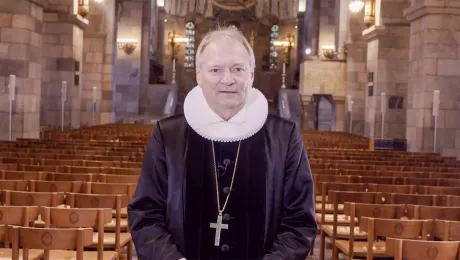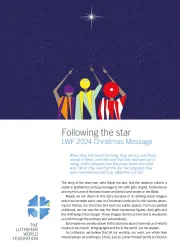
During the church service for the launch of the campaign of Bread for the World with the theme
60 years of cooperation: Bread for the World and LWF
(LWI) – The cooperation between the Lutheran World Federation (LWF) and Bread for the World, the international development organization of the Protestant churches in Germany, goes back over decades. The LWF was already connected with the campaign “Bread for the World” when it was founded on 12 December 1959 in Berlin, Germany. This partnership has now also been honored on the organization’s 60th anniversary.
LWF General Secretary Rev. Dr Martin Junge paid tribute to Bread for the World at the festive evening marking its 60th anniversary in Rendsburg, Germany, on the weekend. “We share a convincing vision and our many years of commitment to suffering, exploited and marginalized people,” he remarked. “LWF and Bread for the World have developed a strong partnership during the years. Many of the little seeds we planted together, are today big trees, tall and strong: communities accessing their rights, and living a life in dignity. A lot has been achieved, yet more work waits for us. We will do it together, wherever possible.”
Standing with refugees and migrants
As a symbol of the LWF’s work with refugees and migrants, Junge presented a manger used by a mother of the Nuer ethnic group from South Sudan, now living at the Gambellarefugee camp in Ethiopia. At present, LWF World Service is supporting people affected by the South Sudanese conflict in South Sudan itself and in Ethiopia, Kenya and Uganda.
Globally LWF World Service – the humanitarian arm of LWF – in 2018 worked with 2.3 million people in 26 countries. These focus on securing livelihoods, ensuring services such as water, education and health promotion, and promoting the security and dignity of all in social cohesion.
From Europe to the global world
Assistance for people in war and crisis areas has been a significant concern of the LWF since it was founded in 1947. At that time the LWF was involved in supporting refugees, displaced persons and needy people in Europe, which was suffering from the destruction caused by the Second World War.
Bread for the World was founded in 1959, as Germany was recovering economically, and the era of decolonization was dawning in many other countries. Those who had received assistance before were now able to help others: awareness arose in Europe of the poverty, hunger and injustices in other continents.
One of the speakers at the founding ceremony in 1959 was the then 80-year-old Otto Dibelius, a former bishop of the Evangelical Church of Berlin-Brandenburg and chair of the EKD Council. “Hunger in the world is a great indictment which we should all feel is directed at us,” he said. “We want to help like the Good Samaritan in the parable – he didn’t ask any questions about race, class or creed.”
LWF and Bread for the World are regular partners
In 2019 Bread for the World is cooperating with the LWF World Service on 33 projects in 14 countries, for which it has designated sums totaling approximately 9.6 million euro.
Projects range from small scale farmers food security in Angola, sustainable management of natural resources in Central America and a rights-based empowerment project in Rakhine State, Myanmar, to creating an improved learning environment for Jordanian and refugee children in Jordan.
There are many more examples of activities growing from this partnership today, e.g. scholarships for training mostly young people. Other examples are initiatives to combat poverty in cooperation with LWF member churches in the African Region, a worldwide network for gender justice and empowering women, or pilot projects to implement the UN’s Agenda 2030 and the goals for sustainable development, including in the Lutheran Church in Liberia.
Hunger for justice
The theme of Bread for the World’s appeal for donations is “Hunger for Justice”. This year’s campaign was launched on the first Sunday in Advent with a service in Rendsburg’s Christ Church that was broadcast on national public television. “On the basis of our faith we are convinced that every single life counts,” said Junge, who took an active part in the service. “God calls us to be advocates of God’s creation, caring for it instead of exploiting it, and also to respect each person’s God-given dignity.”


